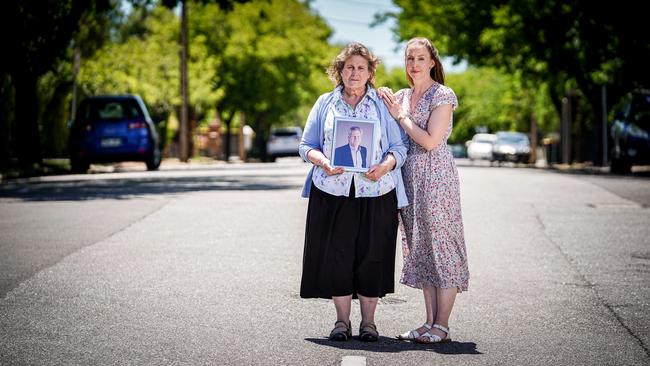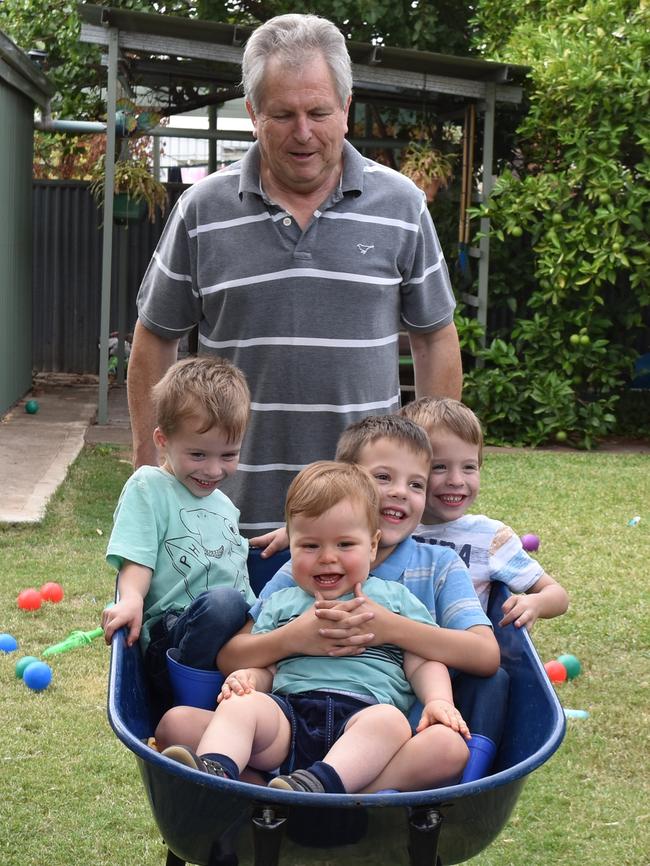Road to Justice: ‘How could there be justice in a 20-month sentence?’
The driver who struck and killed Brenton Curtis was speeding, had a blood-alcohol level of 0.12, was suspended from driving and didn’t call Triple 0. He served less than two years in jail.

Police & Courts
Don't miss out on the headlines from Police & Courts. Followed categories will be added to My News.
The great loves of Brenton Curtis’ life were his children and grandchildren, his job and his Sunday bike rides – and, most especially, his wife Wendy.
They were a near-unbeatable team, working around their commitments and Mrs Curtis’ health issues to forge a life filled with love, family and – in 2017 – plans for their future.
“I was 14 when we started dating … I don’t really remember a time in my life before he was in my life,” Mrs Curtis said.
“It was nearly our 40th anniversary, we were planning on going to Kangaroo Island and staying somewhere nice to celebrate … I was waiting for him to retire so we could have more time together.”
His daughter, Kimberly Gilmour, was pregnant at the time and could not wait for her father to meet the latest member of their growing family.

“Dad was 62 and he was fitter than all of us … he would have ploughed on for decades and decades more,” she said.
In October 2017, however, Mr Curtis was struck and killed by driver Garang Akech Luk as he cycled in a Salisbury Plains bike lane.
Luk, then 19, was speeding, had a blood-alcohol level of 0.12, was suspended from driving at the time and neither tried to help Mr Curtis nor called Triple 0.
In an instant, the Curtis family had been robbed of their patriarch – and over the months that followed, they would be stripped of their faith in the SA courts system.
They watched, feeling marginalised and isolated, as the Adelaide Magistrates Court varied Luk’s bail so he could travel interstate and play basketball.
They listened, feeling ignored and “like a nuisance”, as prosecutors and defence counsel negotiated the case toward a plea bargain resolution.
And they were stunned when, despite the factors aggravating Luk’s offending, the District Court sentenced him to just two years’ jail with a 20-month non-parole period.
“I don’t believe we have a justice system – we have a legal system, not a justice system,” Mrs Curtis said.
“It felt like there was no value placed on Brenton’s life, like they didn’t take into account what Brenton lost and what we lost as a family.
“There is no justice … how could there be justice in a 20-month sentence?”
The Curtis family have joined The Advertiser’s campaign for parliament to set sentencing standards for aggravated causing death by dangerous driving.
Mrs Gilmour said only mandatory minimum sentencing could address years of inconsistent punishments and properly reflect community expectations.
“This was no accident – Luk was breaking multiple laws, and that led to him killing my father,” she said.
“There’s an expectation, when somebody kills somebody else, that they will be significantly punished.
“Luk clearly had a complete disregard for the law … these aggravated cases where there are multiple laws broken should lead to hefty consequences.”
Mr Curtis’ son, Ashley, said the sentences handed down over the past 20 years showed “a disconnect” in the way courts viewed different types of fatal crime.
“Somebody has been killed and, in every other area of the law, that carries severe consequences – but not in causing death by dangerous driving,” he said.
“If you are murdered while walking down the street, you’re seen as innocent – if you’re on the road, it’s almost as if you’re seen as culpable in some way.”

He said sentences needed to increase not only to deter other drivers, but also to give victims a sense of justice and allow them to heal.
“I try to think how I can forgive Luk, for my own sake, but when every day I see how much we have lost, how can I come to terms?” he said.
“I remember my dad in hospital, I remember the terrible injuries he suffered, I remember his awful passing.
“Dad has passed away, he’s at peace, I miss him, I feel sorry for what he doesn’t get to see, but I feel more sorry for my sons and for my mum, who’s now on her own.”
Mrs Curtis said her life has become “exponentially and extremely harder” without her husband.
“I have to pass the spot where the crash happened all the time … for the first year, the paint marks were still on the road,” she said.
“He never got to enjoy what he worked so hard for, and that’s my biggest regret for him.”
She said there was a clear need to parliament to legislate and force change.
“There are people who spend longer in jail on remand, waiting for their day in court, than some people serve for killing someone with a car,” she said.
“There are people getting longer jail terms for stealing a car than for killing someone with a car.
“There’s no consistency – one person shouldn’t get a $300 fine while another person goes to jail.”





